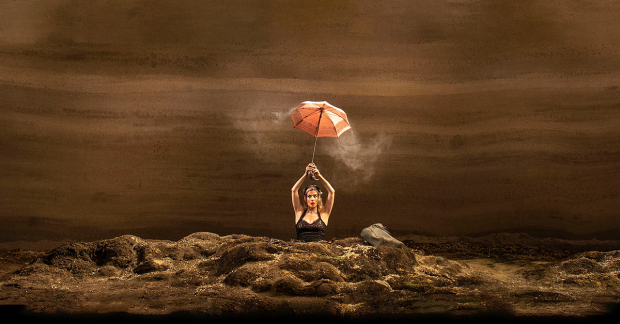Review: Happy Days (Riverside Studios)

© Helen Maybanks
Happy days are here again…almost. While performances are back, the existential dread sparked by Covid has yet to exit stage left (not helped by Monday's delay to the government roadmap). It seems fitting that Samuel Beckett's revival of Happy Days, directed by the stage vet that is Trevor Nunn, makes its return against such a backdrop – you probably couldn't find a better time to stage the abstract text, though, like all best laid plans, the show had been in the pipeline well before the pandemic began.
Seemingly set against the gloam of civilisation and exclusively following a woman submerged to her waist in soil, Beckett's 60-year old piece is an iconic one – the role of the semi-submerged Winnie being long held as one of the most prestigious in the canon. It's by no means a cake walk (or a cake-sink?): Beckett's text is chock full of repeated cadences, codas and catchphrases, spat out by Minnie under the eternal glare of some oppressive sunshine – so powerful that at one point her garishly pink umbrella is set alight.
The role has naturally drawn some stage heavyweights in its time – more recently, the likes of Maxine Peake and Juliet Stevenson have sat in Winnie's subterranean spot. But it's safe to say that it's a part Beckett-regular Lisa Dwan was made for. Given the physical restrictions any performer faces (with the second act seeing Winnie buried from neck down), the key to a successful turn comes in the facial expressions and voice, and, as luck may have it, that's something Dwan has a sturdy track record for providing – once rattling through the playwright's Not I, in close to 9 minutes in 2013 – the theatrical equivalent of setting a 100m world record. The Bloodlands performer is as riveting here – her voice simultaneously hoarse and dry, while also being infantile and chipper. She strays from Irish lilt to clipped British twang, both haggard and full of joie-de-vivre(-dans-un-trou).
It's these sorts of paradoxes that a Beckett fan would lap up in spades, because Happy Days is all about the murky liminality between two absolutes. First of all there's the space between life and death – Minnie being half way to six feet under, then that between loneliness and company (while her husband Willie, a grovelling Simon Wolfe, sometimes crawls out of a small cave tucked behind Dwan to respond to her cries, other times she's left alone) and finally that between civilisation and destruction (designer Robert Jones dresses Winnie in a premium black dress, pitted against a rugged, arid landscape).
Whether you enjoy two hours in Winnie's company will probably come down to whether you want to escape from the dirge of forced isolation that we've all had an unhealthy dose of recently, or instead revel in the nuances and intricacies of that same feeling. Nunn's production: tempered yet unambitious, is about as faithful a replication of Beckett's intentions as one would hope for. The artificial, two dimensional set looks like it's been zapped straight out of a dated installation at the natural history exhibit, full of desaturated shrubbery and beige tones. It may make some think it bears too much of a resemblance to a museum piece: though one saved from tedium by a masterful central performance.










